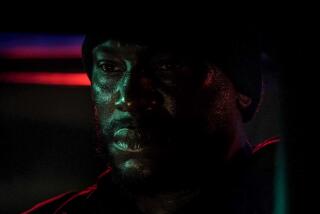‘X-Men’s’ Secret Power
For we longtime comic book fans, there has been no villain quite as cruel or canny as Hollywood. Every few years, movie moguls (they even sound like super villains, don’t they?) pluck their next story line from a beloved comic book and promise silver screen magic.
What they usually deliver is heartbreak and a lump of box office kryptonite.
“The Punisher,” “Howard the Duck,” “Swamp Thing,” “Judge Dredd” . . . the list goes on and on. Sure, “Superman: The Motion Picture” and “Batman” were huge exceptions--but did you see some of those sequels?
All of this is why “X-Men” marks a golden moment for comic book geeks (and recovering comic book geeks, such as myself). The film inspired by the Marvel comic is solid and satisfying, not to mention visually dazzling. But the real secret of its success is the confidence its makers had in the source material. They didn’t mock it, misunderstand it or ignore it.
To risk sounding silly, this is a serious comic book film based on a serious comic book. Moviegoers accustomed to the traditional campy take on comics (“Holy overkill, Batman, can’t we get over the Adam West thing?”) find that out in the first few moments.
The opening scene shows prisoners, some sobbing, some somber, being pushed across a muddy compound by sneering guards. The visual is instantly recognizable: Jews. Nazis. The Holocaust. The jarring passage goes on to show the formative childhood experience of the film’s antagonist, Magneto, and puts a theme of persecution at the film’s core. The film also taps McCarthyism and the civil rights movement for images.
A colleague who saw the movie asked me why the filmmakers would add such serious moments to a comic book story. They didn’t, I told him, they took it all from the comic book.
Bigotry was a theme of the “The X-Men” from the first issue in 1963. The basic story follows Charles Xavier, a telepath, who tracks down others with strange powers. These mutants, the next step in evolution, are feared and despised, but Xavier believes they must be a force of good.
Created by writer Stan Lee and artist Jack Kirby (the latter, arguably the most important comic book creator ever, has been shockingly omitted in much of the press about the film), the comic was part of Marvel’s upstart line of titles that injected youth angst, social issues and pop culture into story lines.
“There was nothing like that before,” Lee told me a few months ago, “and the high school and college kids went crazy for it.”
Well, they went crazy for “The Fantastic Four” and “The Amazing Spider-Man,” but “The X-Men” actually floundered and, in the mid-70s, hovered near death. It was revived with the addition of new heroes--among them the film’s Wolverine and Storm--and, later, a vivid run of classic stories by writer Chris Claremont.
Like the 400,000 other monthly readers who made “The X-Men” the most popular 1980s comic, I grew up passionately devoted to the outcasts in Claremont’s bizarre soap opera. It became my mission to own every issue, by then numbering about 130.
Feel free to mock me (you won’t be the first) but one of the happiest moments of my youth was finding a copy of that 1963 first issue at a flea market in 1981. It was mottled and torn, but it was treasure to my 11-year-old eyes. After handing over a quarter, I checked twice to confirm I was actually the new owner. The seller nodded with an expression that said: “Move along, weird little fat boy.”
Yes, I knew what it was like to be an outsider like one of Lee and the late Kirby’s tortured mutants. And from the box office success of “X-Men,” the heroes still resonate with today’s youth.
But there’s reason to be worried that these comic book heroes are in peril, at least on the printed page.
The central question in the “X-Men” is this: If sleek, superpowered humans showed up, would the old species become obsolete? In a way, the plot parallels what’s happening to the American comic book.
“X-Men,” “The Matrix” and other comic book-style movies with sensational, turbo-charged visuals make comics seem impotent to young eyes. Same for video games, which gobble up kids’ time and money. Moreover, some of the once-singular ethos of comics has been copped by television shows like “Buffy the Vampire Slayer,” “Xena” and even the gaudy gladiators of pro wrestling.
The result is a tough time for comics. The readership of “The X-Men,” for example, has dropped two-thirds since the 1980s. “We’re losing the kids,” a Marvel spokesman told me Saturday at a San Diego comics convention.
I met Claremont, now a Marvel editor, at the convention, and he seemed thrilled by the “X-Men” film, which borrows heavily from his work. He sighed deeply, though, when asked about the future of comics.
“We’ve lost our distribution networks,” he said, detailing a grim industry trend. “You can’t buy comics on newsstands.” Still, Claremont is glad to see comics fare better as a Hollywood idea factory. Spider-Man and Daredevil are on deck as films, as is an “X-Men” sequel.
After we talked, I browsed the huge showroom. At one table, I found a ratty copy of the first issue of “Spider-Man,” a comic rare enough to be worth hundreds, even in such sad shape. It was a book I would have died to own as a kid, and I thought hard about buying it on the spot. No, I thought, I think I’ll wait for the movie.
*
Nearing the Magic Number
* “X-Men’s” 10-day gross is just short of $100 million, but it lost the weekend battle to “What Lies Beneath.” F6
More to Read
Only good movies
Get the Indie Focus newsletter, Mark Olsen's weekly guide to the world of cinema.
You may occasionally receive promotional content from the Los Angeles Times.







